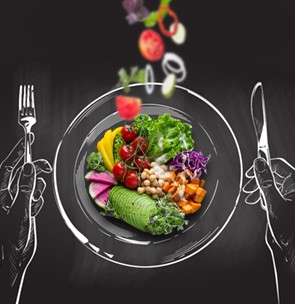

Published on May 12th, 2023

A plant-based diet is basically a diet made from plants, fruits, and vegetables plus nuts, seeds, whole grains, and legumes. A plant-based diet is not a vegetarian or vegan diet; you can eat poultry, beef, eggs, fish, and dairy products, however, most of your nutrient intake is coming from plant-based food sources. There is no set ratio of plant to animal foods on a plant-based diet, but at least 2/3 of each plate of food (or meal) you eat is a good way to start. The emphasis should be on plants.
A plant-based diet is considered to be powerful nutrient-dense and packed with fiber, healthy fats, proteins, vitamins, and minerals. It is a very healthy way of eating and can meet all of your nutrient requirements.
Most adults can benefit from a plant-based diet. Research shows that plant-based diets may prevent and treat chronic diseases and reduce dependence on medications. If you suffer from a digestive disease, consult your doctor prior to changing your diet.
Try not to equate protein with meat. There are a lot of great plant-based protein sources, including tofu, lentils, beans, nuts and nut butter, seeds, and quinoa. Don’t forget: Dairy, eggs, beef, poultry, and fish are allowed on the plant-based diet, they just shouldn’t be the center of the meal.
Getting started on a plant-based diet may seem overwhelming, but take it one day at a time. Eat a variety of fruits and/or vegetables with all meals. Incorporate whole grains, such as oatmeal, quinoa, farro, brown rice, or whole wheat bread. Healthy fats avocado, nuts, olives, and seeds are a great way to keep you satisfied.
To start: Each meal or snack should be made up of 2/3 plants and no more than 1/3 animal products (egg, yogurt, fish, or poultry). As you get used to eating more plants, try limiting yourself to one animal product a day.

High blood pressure, or hypertension, can increase the risk for health issues, including heart disease, stroke, and type 2 diabetes. Fortunately, the foods you eat can make a difference. Several studies have shown that sticking with a plant-based diet can reduce blood pressure, thereby reducing your risk for those conditions.
Meat contains saturated fat, which can contribute to heart issues when eaten in excess. So by cutting back on meat and loading up on plant-based foods, you’re doing your ticker a favor. But it’s not just about limiting meat: To help prevent cardiovascular disease, you want to consume foods that are anti-inflammatory, which happen to be mainly plant-based foods. These include green leafy vegetables, yellow vegetables, whole grains, walnuts, extra virgin olive oil, fatty fish, tomatoes, and fruits. Likewise, you’ll want to avoid pro-inflammatory foods, such as processed meats, processed foods, fried foods, and refined sugar.

One reason for the weight loss is that whole grains and vegetables are relatively low on the glycemic index which means they’re digested more slowly and fruit contains antioxidants and fiber, which helps prolong fullness, according to research.
High cholesterol can lead to fatty deposits in the blood, which can restrict blood flow and potentially lead to heart attack, stroke, or heart disease. But a healthy diet can help keep cholesterol levels in check. Specifically, moving away from a diet filled with animal products toward one that’s primarily plant-based can lower LDL (“bad”) cholesterol by between 10 and 15 percent, while those following a strict vegan diet can lower their LDL cholesterol by as much as 25 percent, according to a review of 27 studies published in The American Journal of Cardiology.

The danger of stroke doubles if you carry high blood pressure, indulge in overweight, have diabetes, and heart disease, hold high cholesterol, or smoke, drink or use drugs. As mentioned above, these alarming factors can be vanished by working on a plant-based diet and picking up effective lifestyle options. After all, half of the strokes are preventable. One simple way to reduce your risk is by increasing your intake of fruits and vegetables. The highest consumers of fruits and veggies had a 21 percent lower risk of stroke than those who consumed the least, according to a study.
Switching to a plant-based diet secures your health and well-being both strongly. However, nature supports humans in the shape of its plant-based growth which carries goodness to the fullest.
BackBe the first to know about new products, events and offers.